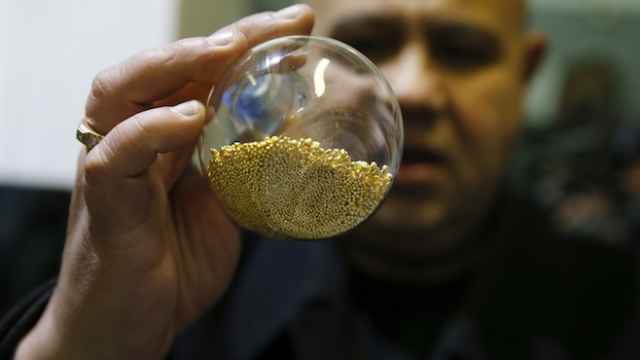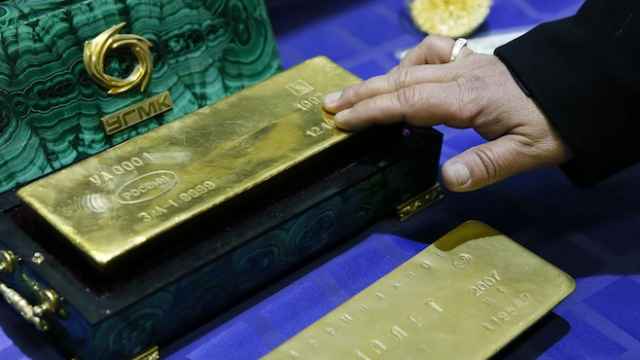Ukraine slashed its gold reserves by more than a third in October, data from the International Monetary Fund showed, as the near-bankrupt country reels from fighting a pro-Russian separatist movement in the east.
The reserves data from IMF also showed Russia raised its gold holdings for a seventh straight month in the same period — the country's longest such buying spree in more than a year.
Ukraine ended last month with 26 tons of gold, down by 14 tons from September, while Russia added another 18.9 tons, taking its total to 1,168 tons — still the fifth biggest holding by a central bank.
Ukraine, locked in a conflict with separatists since early this year, is near bankruptcy, dependent on international loans, and deeply in debt for natural gas to Russia, the former imperial master it accuses of waging war on behalf of separatists on its territory.
Its currency, the hryvnia, has lost 83 percent of its value against the dollar this year and its foreign currency reserves plunged to a nine-year low last month.
The crisis has also had an impact on Russia's gold holdings with the Central Bank being forced to step up buying from domestic producers hurt by Western sanctions, and to boost liquidity in its foreign reserves.
It was not known if Ukraine has continued to sell gold reserves in November as well.
More selling by Ukraine, or any other central bank, could hurt gold prices, which earlier this month sank to 4-1/2-year lows following a sell-off that began in late October. Gold is extremely sensitive to buying and selling by central banks — the biggest holders of bullion.
In 2013, gold tumbled $200 an ounce in two days on fears that Cyprus — with less than 15 tons of gold — could sell bullion to shore up its finances. That drop in April sparked a big sell-off with gold losing 28 percent last year.
IMF data on Thursday also showed Turkey cut its holdings by 2.7 tons to 521 tons and Azerbaijan raised its reserves by 3.2 tons to 30.2 tons. Belarus added 2.1 tons to 41.1 tons.
A Message from The Moscow Times:
Dear readers,
We are facing unprecedented challenges. Russia's Prosecutor General's Office has designated The Moscow Times as an "undesirable" organization, criminalizing our work and putting our staff at risk of prosecution. This follows our earlier unjust labeling as a "foreign agent."
These actions are direct attempts to silence independent journalism in Russia. The authorities claim our work "discredits the decisions of the Russian leadership." We see things differently: we strive to provide accurate, unbiased reporting on Russia.
We, the journalists of The Moscow Times, refuse to be silenced. But to continue our work, we need your help.
Your support, no matter how small, makes a world of difference. If you can, please support us monthly starting from just $2. It's quick to set up, and every contribution makes a significant impact.
By supporting The Moscow Times, you're defending open, independent journalism in the face of repression. Thank you for standing with us.
Remind me later.






